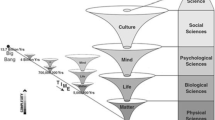Abstract
Many of the world’s current problems are the result of behavior, and traditional appeals to mental determinants are again proving inadequate. The time for a behavioristic alternative appears ripe, yet many behaviorists seem to be becoming less behavioristic and more mentalistic. When confronted with the complexity of human behavior many are resorting to the intellectual comfort and safety of mentalism. A recent example of this tendency (Schwartz et al, 1978) is presented and discussed. Additionally, speculations regarding the origins of the resurgence of mentalism are presented, and it is proposed that arranging histories which provide for more rigorous and lasting control of verbal behavior about behavior may serve to improve the situation.
Similar content being viewed by others
Reference Note
Day, W. On the difference between radical and methodological behaviorism. Presented at meeting of Midwestern Association for Behavior Analysis, Chicago, May, 1977.
References
Baer, D. M., R. F. Peterson and J. A. Sherman. The development of imitation by reinforcing behavior similarity to a model. Journal of the Experimental Analysis of Behavior, 1967, 10, 405–416.
Breland, K. and Breland, M. The misbehavior of organisms. American Psychologist, 1961, 16, 681–684.
DHEW. HRA, HSA, CDC, OASH, & ADAMHA Public Advisory Committees, Authority, Structure, Functions, Members, Nov. 1, 1978. DHEW Publication No. HRA 79–601, 1978.
Ferster, C. B. Is operant conditioning getting bored with behavior? Journal of the Experimental Analysis of Behavior, 1978, 29, 347–349.
Hefferline, R. F., B. Keenan, and R. A. Harford. Escape and avoidance conditioning in human subjects without their observation of the response. Science, 1959, 130, 1338–1339.
Honig, W. K. and Staddon, J. E. R. (Eds). Handbook of operant behavior. Englewood Cliffs, New Jersey: Prentice-Hall, 1977.
Schwartz, B., Schuldenfrei, R. and Lacey, H. Operant psychology as factory psychology. Behaviorism, 1978, 6, 229–254.
Skinner, B. F. Science and human behavior. New York: Free Press, 1953.
Skinner, B. F. Contingencies of reinforcement: a theoretical analysis. New York: Appleton-Century-Crofts, 1969.
Skinner, B. F. Beyond freedom and dignity. New York: Alfred A. Knopf, 1971.
Skinner, B. F. About behaviorism. New York: Alfred A. Knopf, 1974.
Taylor, F. W. Principles of scientific management. New York: W. W. Norton, 1967.
Author information
Authors and Affiliations
Additional information
Preparation of this paper was aided by USPHS Grant No. DA-01417 from NIDA. A version of the paper was presented at the annual meeting of the Association for Behavior Analysis, Dearborn, MI, June, 1979.
Rights and permissions
About this article
Cite this article
Branch, M.N., Malagodi, E.F. Where Have All the Behaviorists Gone?. BEHAV ANALYST 3, 31–38 (1980). https://doi.org/10.1007/BF03392376
Published:
Issue Date:
DOI: https://doi.org/10.1007/BF03392376



